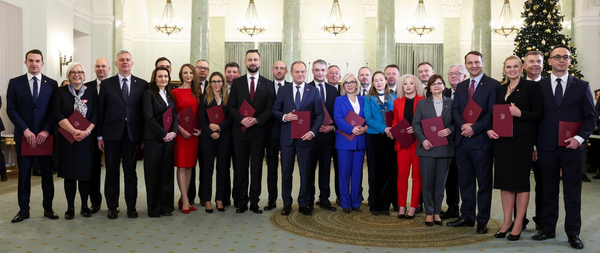
Polish gov’t creates economy superministry in major cabinet reshuffle
Polish Prime Minister Donald Tusk announced a wide-ranging cabinet reshuffle on 23 July, creating a unified finance and economy ministry under Polish Finance Minister Andrzej Domanski.
The streamlining of Poland's ministries from 26 to 21 comes as the ruling Civic Coalition (KO)-Third Way-Left bloc seeks to recover political momentum ahead of the 2026 election.
The model reflects past moves in Hungary and Romania to centralise economic power, often justified as way to improve implementation. Poland’s approach, however, appears more technocratic, with few political figures outside the prime minister and foreign minister elevated.
Motyka to head up separate energy ministry
Domanski's new superministry consolidates the former ministries of finance, development and technology, and elements of industrial policy, positioning Domanski at the centre of Poland’s fiscal and economic decision-making.
A separate Polish Ministry of Energy was also created, to be led by Milosz Motyka, a former deputy climate minister. Meanwhile, Polish Foreign Minister Radoslaw Sikorski has been promoted to deputy prime minister while retaining his current role, Polish government spokesperson Jan Grabiec confirmed.
Gov't official hails ministry mergers as historic
In a commentary published on the day of the announcement, Business Insider Polska quoted a government source as saying the move was “the most ambitious structural reform since EU accession”.
Speaking after the reshuffle, Domanski said the new institutional setup would “accelerate decision-making and eliminate overlapping competences”, adding that it was designed to offer “clarity and efficiency for investors, entrepreneurs and society”.
Tusk said on 23 July that the government would issue new regulations defining the precise division of responsibilities between ministries.
KO falling in polls
The creation of the economy superministry comes amid growing tensions inside the governing coalition and falling poll numbers. Tusk had signalled a reshuffle earlier this year in response to calls for greater cohesion and performance.
Support for the coalition parties has fallen to 39%, down from 46% in February, according to a United Surveys poll published on 19 July by website Wirtualna Polska.
The KO holds 157 seats in Poland’s 460-member Sejm. However, the governing alliance with the centre-right Third Way and the Left has shown signs of strain over key policy areas, including energy, justice reform and implementation of EU funds.
Gov't bets on strategic approach
Polskie Radio 24 reported that the consolidation would likely shift long-term strategic planning and budgetary oversight under one roof, although concerns remain over the risks of excessive centralisation.
The Polish cabinet is expected to adopt legal amendments in the coming weeks to formalise the new ministerial structure.
“Institutional strength lies in transparent accountability, not only structural consolidation,” Marek Tatala, vice-president of the Warsaw-based Economic Freedom Foundation, said in a 24 July interview with Rzeczpospolita.





